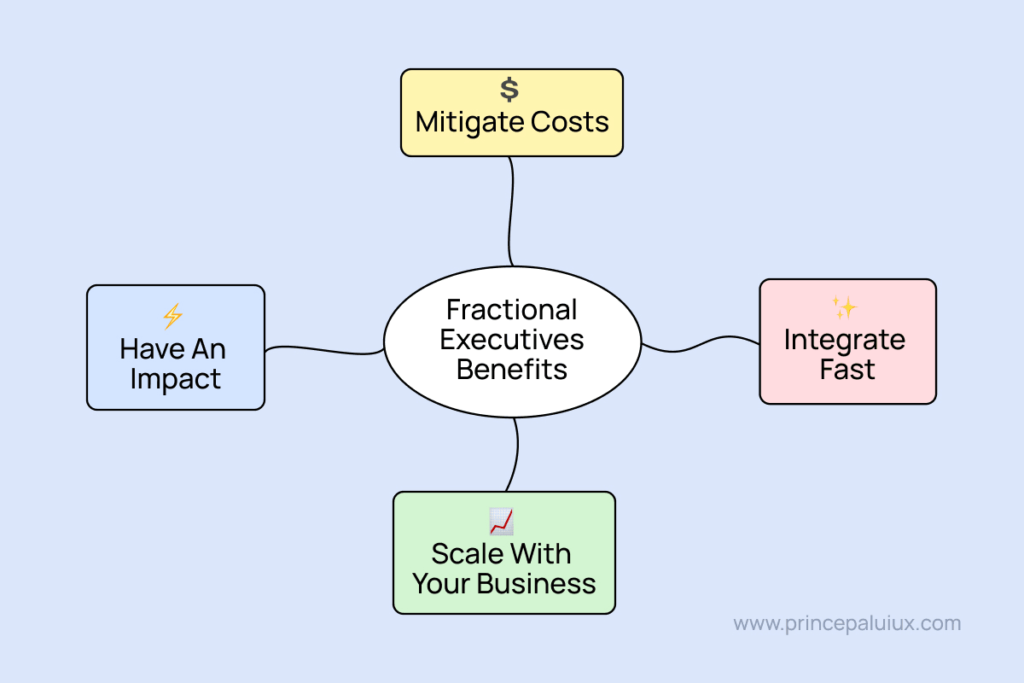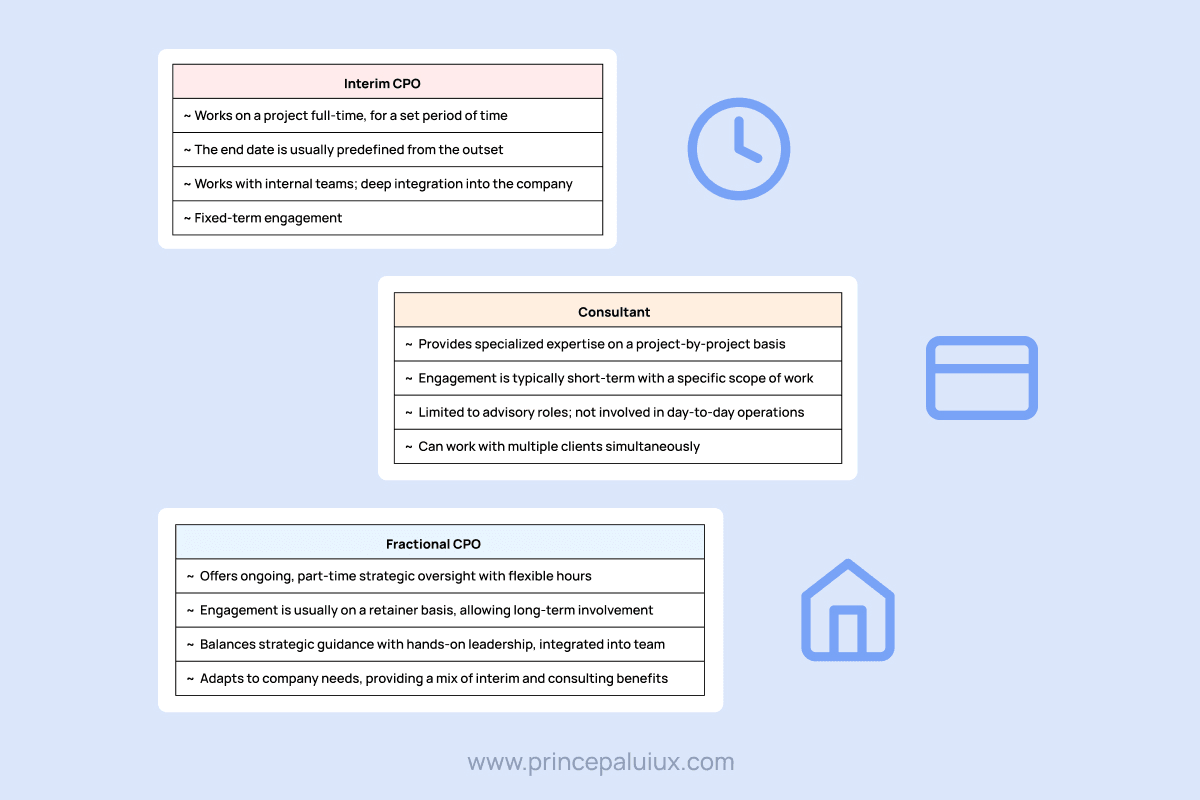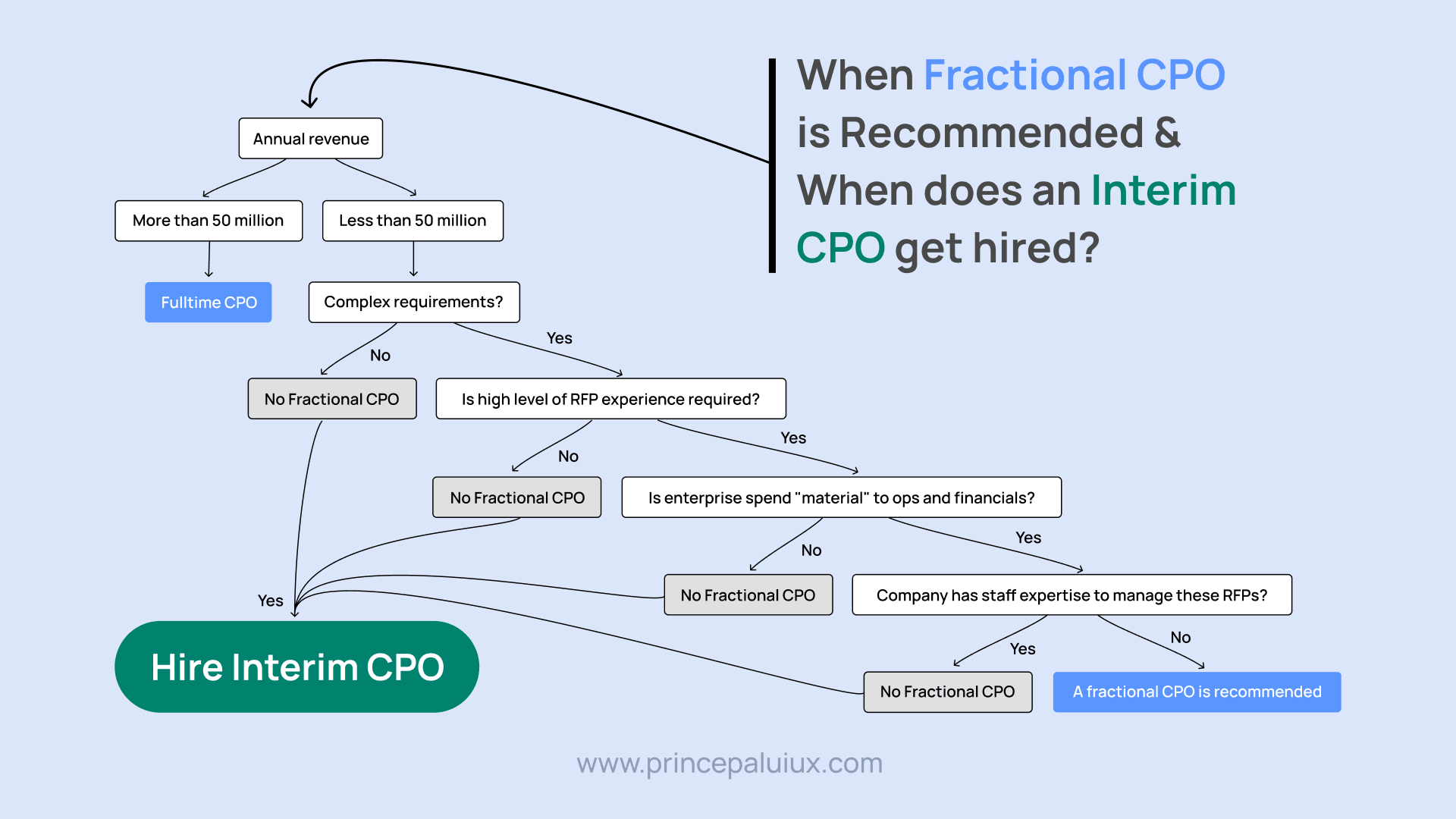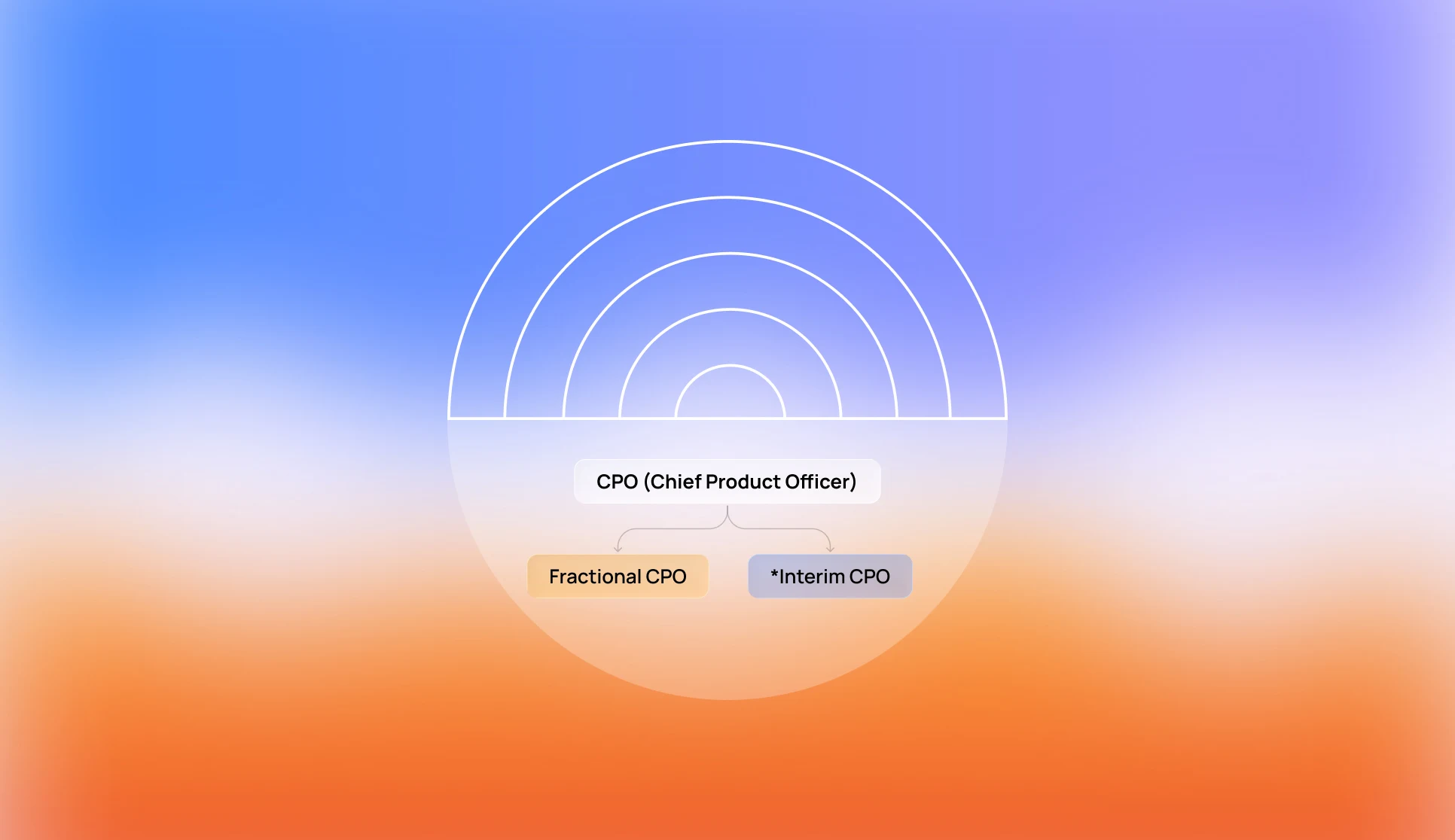In this article, I explore the key differences between Fractional and Interim CPOs—what they do, when to hire them, and why they matter. Whether you’re filling a temporary leadership gap or need long-term strategic guidance without a full-time hire, understanding these roles can help your startup stay focused, aligned, and ready to grow.
Startups move fast—and when product leadership is missing or misaligned, that speed can turn into chaos pretty quickly.
Whether you’re scaling rapidly, dealing with a sudden leadership gap, or simply not ready to bring on a full-time executive, both Fractional and Interim CPOs can provide precisely the support your team needs. But let’s be clear—they’re not the same.
In this article, we’ll explore the differences between the two, share real-world examples, and help you figure out which type of product leader is the best fit for where your company is right now—and where you’re headed.
Now, let’s talk about that word: Fractional.
It’s a funny term. Not one that immediately inspires clarity—especially in the business world, where it’s being thrown around more and more. And recently, I’ve had quite a few people reach out with the same kinds of questions:
“What exactly does ‘fractional’ mean?”
“How can someone lead product part-time?”
“Aren’t you too disconnected if you’re not fully embedded?”
“Can you actually create value without being emotionally all-in?”
Honestly, all fair questions. I’ve asked myself versions of them, too.
So I thought I’d pull back the curtain a bit—share some insights from my own experience working as a Fractional CPO over the past year. I’ll touch on how I’ve structured engagements, what’s worked, what hasn’t, and how I’ve tried to make a real impact on the teams I’ve supported.
If you’re thinking of stepping into fractional work yourself—or if you’re a founder or executive wondering whether this kind of role could help your business—this should give you a clearer picture of what it actually looks like in practice.
What Is a Fractional Chief Product Officer?
There’s a growing role in the product world that’s quietly making waves—especially in startups and mid-sized companies. It’s called a Fractional Chief Product Officer, or just fractional CPO for short.
It might sound a little buzzy at first. Fractional? Like… part-time? Sort of. But there’s more to it than that.
In simple terms, a fractional CPO is a senior product leader who works with a company on a part-time or contract basis—usually across a few clients at once. They bring deep product strategy expertise without the company having to hire a full-time executive.
Think of it like having a seasoned product visionary in your corner—someone who’s seen the 0-to-1 journey, the messy scaling phases, maybe even a pivot or two—but you’re only paying for a slice of their time.
That’s the “fractional” bit.
But Why Would a Company Do That?
Let’s be honest. Hiring a full-time Chief Product Officer isn’t cheap. Salaries can hit $200K–$300K+ annually in many markets, and that’s before you count equity, benefits, and onboarding time.
And yet, many startups—especially those post-seed or Series A—desperately need strong product leadership. Not just someone to manage backlogs, but someone to shape the product vision, align it with business goals, and bring a user-centric mindset to the table.
A fractional CPO bridges that gap.
You get someone who’s built products before. Someone who’s made the tough tradeoffs. Someone who won’t panic when growth slows or when customers start churning for reasons no one can quite explain.
What Do They (CPO) Actually Do?
That varies. A lot.
Some fractional CPOs come in to guide strategy. They’ll look at your product-market fit, talk to customers, and figure out where your roadmap is helping—or hurting—you.
Others might mentor your in-house team. Or help you hire. Or fix your feedback loops. Or reset your OKRs, because nobody on the team remembers who even wrote them.
You might find one working two days a week, reviewing roadmap priorities with the CEO, and making sure design, engineering, and marketing are all actually solving the same problem. Or one who pops in monthly to run product leadership workshops and sanity-check strategic bets.
It depends on what the company needs—and what the CPO is offering.
- Setting the Product Vision
They help define where the product is headed—not just next month, but long-term. Think of it like answering the “Why are we building this?” question before anyone starts wireframing anything. - Building the Roadmap
Once the vision is clear, it’s time to break it down into something more practical. That’s where roadmaps come in. What gets built, when, and why? They’ll help lay out that path with key milestones, balancing speed with strategy. - Watching the Market
Markets move fast. A good fractional CPO stays on top of trends, competitor moves, and shifting user expectations so the product doesn’t fall behind or feel outdated before it even launches. - Leading the Team
Even if they’re only part-time, fractional CPOs often coach and guide product managers and designers. It’s not about micromanaging—it’s more like helping the team level up, work better together, and focus on what really matters. - Managing Stakeholders
There’s always someone who needs to know what’s happening—founders, investors, customers, sometimes even legal or ops. A big part of the job is making sure everyone’s aligned and not pulling in different directions. - Measuring What Matters
Gut feelings are fine, but data helps you sleep better at night. They’ll define the right KPIs, track performance, and make sure decisions are grounded in absolute numbers—not just hunches. - Listening to Customers
And finally, they help make sure customer feedback isn’t just collected—it’s actually used. Whether it’s through interviews, surveys, or support tickets, they turn those insights into product improvements that move the needle.
Is It Just a Fancy Consultant Role?
Sort of… but not really.
Fractional CPOs often embed more deeply than consultants. They’re not just advising from the sidelines. Many take ownership of outcomes. They sit in on leadership meetings, influence cross-functional teams, and often serve as the voice of the product at the table.
That said, some do blur the line between advisory and execution. And sure, a few lean more toward a “strategy deck” than a “hands-on roadmap.” But the best ones know when to zoom in and when to zoom out. That balance is hard to fake.
Who Becomes a Fractional CPO?
Usually, they’re former full-time CPOs or VPs of Product. People who’ve led teams, launched products, and maybe burned out on the 60-hour grind (or want more variety).
Some want flexibility. Others enjoy jumping into different business models or domains. I’ve even heard one describe it as “a way to keep learning without having to play corporate politics.”
They’re not junior. They’ve been around the block. That’s the point.
Is It Right for Every Company?
Nope. That’s the honest answer.
If you’re pre-product and still figuring out what your product even is, a fractional CPO might be overkill. Or if you already have a strong product leadership team and need someone to execute? Again, maybe not the right fit.
But if you’re stuck in a murky middle ground—say, you’ve got a product, some users, and maybe even some revenue, but no clear product vision or scalable process? That’s where a fractional CPO can be a game-changer.
When Does It Make Sense to Bring in a Fractional CPO?

Let’s be real—hiring a full-time product executive isn’t always the most practical move. Sometimes you don’t need one forever; you need someone right now who knows what they’re doing. That’s where fractional CPOs come in. Here are a few situations where having one on board can be a smart call:
Startups Figuring Things Out
If you’ve just launched your startup and feel like you’re still piecing the puzzle together, you’re not alone. Product strategy, team structure, market fit—it’s a lot. A fractional CPO can help steer that early chaos into something more focused. They’ll guide you on how to build a real product team, bring in best practices, and make sure what you’re building actually fits your business model. No fluff. Just clear direction when it counts.
When You’re About to Scale
Growth is exciting… and also messy. Suddenly, what used to work breaks down. Priorities shift. Roadmaps stretch. If you’re preparing to scale—whether it’s new customers, new features, or even new regions—a seasoned fractional CPO can help smooth that ride. They’ll help refine your product strategy, streamline processes, and ensure your team can handle the growth.
Digital Transformation Projects
If your company is embracing digital tools (or finally catching up to them), it helps to have someone who’s done it before. A fractional CPO brings both the tech know-how and the strategic thinking needed to modernize your product approach. They’re not just plugging in new software—they’re rethinking how your product fits into a digital-first world.
Entering New Markets
New markets = new risks. And you usually don’t get many second chances. Whether it’s expanding into another country or targeting a different customer segment, a fractional CPO with global experience can make that leap feel less blind. They’ll help tailor your product, tweak messaging, and avoid the common pitfalls that sink market entry efforts.
Product Turnaround Time
Sometimes, things just… stall. The product’s not performing, users are churning, and no one’s really sure what’s off. In cases like these, an outside perspective can be incredibly refreshing. Fractional CPOs are great at diagnosing product issues, asking the right (sometimes uncomfortable) questions, and putting together a turnaround plan that gets things moving again.
Special or High-Stakes Projects
Not every critical initiative justifies a full-time hire. Maybe you’re launching a significant feature or entering an accelerator program. These one-off, high-impact projects often need executive-level guidance—but only for a while. That’s precisely what a fractional CPO offers: high-touch involvement without the long-term commitment.
Bridging a Leadership Gap
People go on parental leave. Executives step down. Things happen. While you’re looking for a permanent replacement, a fractional CPO can step in to keep the product engine running. They keep the team steady, the roadmap intact, and the decision-making sharp—all while buying you time to find the right full-time leader.
Of course, these are just a few of the everyday use cases. The truth is, any business that’s evolving or growing will hit a point where it could use someone to take a step back and help guide the product strategy. And that “someone” doesn’t always have to be a permanent exec.
What’s the Difference Between a Fractional, Consultant, and Interim CPO?

Honestly, these titles sound pretty similar at first. They all involve bringing in outside help, usually someone with years of product leadership experience. But there are differences—subtle ones, sure, but they matter depending on what your company actually needs.
Let’s break it down:
Fractional CPO
Think of a fractional CPO like a part-time team member who’s still very much in the game. They’re not just advising from a distance—they’re embedded into your team, attending meetings, owning outcomes, and helping shape product strategy alongside you.
- Timeframe: Ongoing, but part-time (maybe 1–3 days/week)
- Involvement: High — they’re in Slack, on calls, talking to your product team
- Best for: Startups or scaleups that need a senior product leader but can’t (or don’t want to) hire full-time yet
- How they show up: Like a long-term teammate, just not every day
In short: They’re “fractional” in time, not in commitment.
Product Consultant
Now, a consultant is more like someone you bring in to diagnose, advise, and then… usually step back. They might run a discovery sprint, audit your roadmap, or help you rethink product-market fit—but they’re not sticking around to implement it all.
- Timeframe: Short-term and project-based
- Involvement: Medium to low — they’ll drop in, deliver recommendations, maybe coach your team a bit
- Best for: Specific problems, big decisions, or moments where you need an outside perspective
- How they show up: Like a specialist — “Here’s what’s wrong, here’s what to fix”
In short: Think of them as strategic advisors, not doers.

Interim CPO
An interim CPO is usually a full-time stand-in. Someone is temporarily stepping into the role of your previous Chief Product Officer—whether that person left, is on leave, or you’re still hiring the right long-term fit.
- Timeframe: Temporary, but full-time (could be 3–6 months or longer)
- Involvement: Very high — they take over complete CPO duties
- Best for: Companies in transition, or ones needing to keep momentum while filling the leadership gap
- How they show up: Like your actual CPO, just with an exit date in mind
In short: They’re your CPO, just not forever.
Need an Interim CPO?
I’m Prince Pal, and I step in when product leadership can’t pause.
Startups like Svaggy, Virtual Dental Care, and Dental.com have trusted me as their Interim CPO—not just to fill a seat, but to drive momentum. Whether it’s aligning cross-functional teams, refining messy processes, or rebuilding clarity around product strategy, I help companies stay on track when it matters most.
If your CPO is out, your roadmap is stuck, or your team needs experienced direction now, let’s talk.

A Quick Recap:
| Role | Time Commitment | Involvement | Goal |
|---|---|---|---|
| Fractional CPO | Part-time | High | Long-term strategy, ongoing execution |
| Consultant | Project-based | Medium/Low | Advisory, insights, problem-solving |
| Interim CPO | Full-time | Very High | Fill leadership gap during transitions |
It’s about what you need.
- Need someone to run the show part-time while keeping strategy sharp? → Go fractional.
- Just want someone to poke holes in your roadmap or do a health check? → That’s a consultant.
- Filling a sudden leadership hole and need someone to step in fast? → Call in an interim.
| Feature | Fractional CPO | Interim CPO | Consultant |
|---|---|---|---|
| Engagement Type | Part-time, ongoing; paid via retainer or hourly | Full-time, temporary; typically a fixed-term agreement | Project-based, often part-time, and scoped upfront |
| Duration | Flexible — usually 6 months to 2 years | Project-based, often part-time, and scoped upfront | Varies by project length and scope |
| Involvement | High — strategic and embedded in the team | Fully integrated into daily leadership | Low to medium — advisory only, not hands-on |
| Focus | Big-picture strategy and ongoing execution | Maintaining momentum during transitions | Solving specific problems or offering specialized input |
| Flexibility | High — adapts to evolving needs and budgets | Limited — tied to the interim timeline | High — typically built around one-time needs |
| Cost Structure | Retainer/hourly — cost-effective for long-term support | Full-time salary (plus potential benefits) | One-time or milestone-based fee |
| Responsibilities | Vision, roadmap, market research, mentoring | Keeping things running, managing handovers | Expert input, audits, and recommendations |
| Best For | Scaling, digital shifts, long-term strategic help | Parental leave, exec exits, temporary leadership gaps | Project-based, often part-time and scoped upfront |
And if you’re not sure which fits best? That’s a good sign to talk it through—because getting the right kind of help at the right time can make or break your next product move.
So… Why Work with an Interim CPO?
By now, you’ve probably got a pretty good sense of when an interim CPO makes sense—and how it compares to consultants or interim roles. But let’s talk about what they actually bring to the table. Why do so many startups, scaleups, and even established companies turn to them?
Here’s the real value:
Deep Product Expertise (Without the Guesswork)
Let’s start with the obvious: these folks know their stuff.
An interim CPO has usually worked across industries, teams, and products. They’ve seen messy launches, scaling pains, pivots gone right—and wrong. That gives them a kind of pattern recognition you can’t fake. They can walk in, look at your roadmap, and say, “You’re about to make a mistake I’ve seen five times before. Here’s what to do instead.”
That kind of experience? Invaluable. Especially when you’re growing fast or stepping into new territory.
Immense Value, Smaller Price Tag
Hiring a full-time/part-time CPO? That can efficiently run you $300K–$400K a year (Glassdoor pegs the average at over $391,000, if you’re wondering).
But with an interim CPO, you get senior-level strategy without the full-time overhead. You might pay anywhere from $100 to $1,500 per day, depending on the person’s experience and region—but either way, you’re spending a lot less than a full-time exec salary.
For startups, bootstrapped teams, or anyone watching their burn rate… that’s a win.
Flexible and Scales with You
Need someone for a few months? Done. Need help just 1–2 days a week? Totally doable. An interim CPO is designed to fit you, not the other way around.
And the cool thing? As your company evolves, its role can shift. Maybe they start by helping you build your first roadmap… then stick around to mentor your new product managers or fine-tune your GTM strategy. It’s fluid. No long-term contracts tying you down.
Strategic Thinking + Real Leadership
This isn’t just someone throwing ideas at you from the sidelines.
A good interim CPO comes in with the mindset of: “How do we grow this product to match the business you want to build?” They’ll help you prioritize the right features, cut through distractions, and align product development with long-term goals.
They also act as a bridge—connecting product with marketing, sales, customer success, and yes, even your investors. So everyone’s rowing in the same direction.
Supporting the Team (and Culture) Too
This part is often overlooked but super important.
An interim CPO doesn’t just lead strategy—they build people. They mentor your team, help you level up junior PMs, and often introduce healthy processes that make everyone more efficient. Think better stand-ups, more precise documentation, tighter handoffs between design and engineering.
And because they’re not tangled in company politics, they often bring a breath of fresh air to the team culture—encouraging curiosity, feedback, and continuous improvement.
Final Note
Whether you’re a startup founder staring down a growing backlog, a product team feeling stretched, or a company in transition—an interim CPO might be precisely the kind of leadership you didn’t know you needed.
They bring senior-level clarity without the full-time overhead. They adapt to your business, not the other way around. And they’re not here to consult—they roll up their sleeves, guide your strategy, support your team, and help your product actually move forward.
Sure, titles like “fractional,” “consultant,” and “interim” can feel fuzzy at first. But once you understand the nuance, the value becomes crystal clear. It’s not about filling a seat—it’s about injecting focused, experienced leadership when and where it matters most.
So, if your product is at a crossroads—or needs sharper direction—it might be time to ask: Do we need someone full-time… or just someone full-force for the phase we’re in?
Sometimes, a fraction is exactly the right fit.
Frequently Asked Questions
1. Why Is an Interim CPO the Best Choice?
Because product leadership gaps are risky—and time-sensitive.
When your Chief Product Officer suddenly leaves, takes a break, or you’re still searching for the right full-time hire, the product can’t just wait. An Interim CPO steps in immediately to keep strategy on track, guide the team, and prevent momentum from stalling.
They bring experience without the long-term commitment, clarity without politics, and can often make faster, unbiased decisions—because they’re not caught up in internal baggage.
In short, an Interim CPO keeps the wheels turning when the leadership seat is empty. And in fast-moving companies, that continuity can make all the difference.
2. What exactly does a Fractional CPO do?
A fractional CPO (Chief Product Officer) steps in part-time to lead your product strategy, guide your team, and help shape the roadmap—without the cost or commitment of a full-time exec. They’re not just consultants handing you a deck; they embed into your team and work hands-on to drive results.
3. How is a fractional CPO different from a consultant or interim CPO?
Good question! A fractional CPO is ongoing but part-time, focused on both strategy and execution. An interim CPO is full-time but temporary—usually filling in during a transition. A consultant, on the other hand, offers specialized advice for a project but usually isn’t involved day-to-day.
4. When does it make sense to hire a fractional CPO?
There are lots of moments when this makes sense: when you’re scaling, launching a product, entering a new market, struggling with product-market fit, or needing senior product guidance but can’t justify a full-time hire. It’s also great for bridging leadership gaps or supporting digital transformation efforts.
5. How much does a fractional CPO typically cost?
Rates vary based on experience and location, but most fractional CPOs charge between $100 $1,500 per day. Compared to a full-time CPO salary (which can exceed $390K/year), it’s a cost-effective way to bring in serious leadership muscle without breaking the budget.
6. Will a fractional CPO be part of the team?
Yes—if you bring in the right person. A good fractional CPO becomes an extension of your team. They’re in your meetings, giving feedback, supporting your PMs, aligning cross-functional teams, and helping you move faster and smarter. They may not be there every day, but their presence should feel impactful.
7. Can a fractional CPO help with team development and culture?
Absolutely. Beyond strategy, many fractional CPOs offer mentorship, help build strong processes, and create a culture of accountability, learning, and collaboration. They’re not just fixing the product—they’re helping the people who build it thrive.
